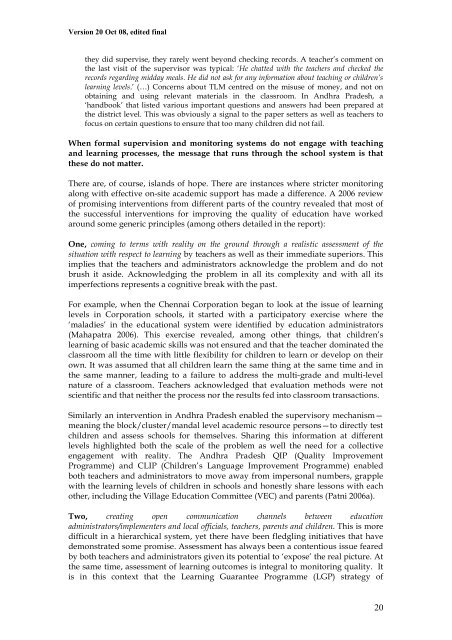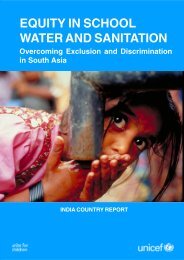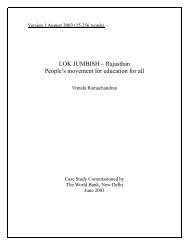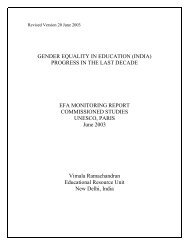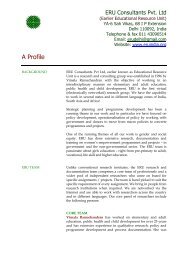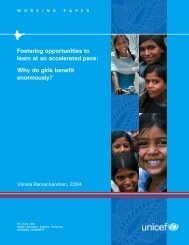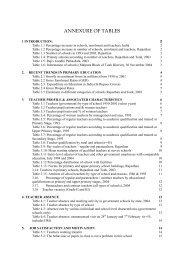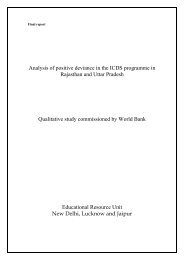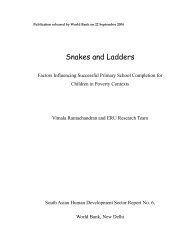primary school teachers the twists and turns of everyday practice
primary school teachers the twists and turns of everyday practice
primary school teachers the twists and turns of everyday practice
You also want an ePaper? Increase the reach of your titles
YUMPU automatically turns print PDFs into web optimized ePapers that Google loves.
Version 20 Oct 08, edited final<br />
<strong>the</strong>y did supervise, <strong>the</strong>y rarely went beyond checking records. A teacher’s comment on<br />
<strong>the</strong> last visit <strong>of</strong> <strong>the</strong> supervisor was typical: ‘He chatted with <strong>the</strong> <strong>teachers</strong> <strong>and</strong> checked <strong>the</strong><br />
records regarding midday meals. He did not ask for any information about teaching or children’s<br />
learning levels.’ (…) Concerns about TLM centred on <strong>the</strong> misuse <strong>of</strong> money, <strong>and</strong> not on<br />
obtaining <strong>and</strong> using relevant materials in <strong>the</strong> classroom. In Andhra Pradesh, a<br />
‘h<strong>and</strong>book’ that listed various important questions <strong>and</strong> answers had been prepared at<br />
<strong>the</strong> district level. This was obviously a signal to <strong>the</strong> paper setters as well as <strong>teachers</strong> to<br />
focus on certain questions to ensure that too many children did not fail.<br />
When formal supervision <strong>and</strong> monitoring systems do not engage with teaching<br />
<strong>and</strong> learning processes, <strong>the</strong> message that runs through <strong>the</strong> <strong>school</strong> system is that<br />
<strong>the</strong>se do not matter.<br />
There are, <strong>of</strong> course, isl<strong>and</strong>s <strong>of</strong> hope. There are instances where stricter monitoring<br />
along with effective on-site academic support has made a difference. A 2006 review<br />
<strong>of</strong> promising interventions from different parts <strong>of</strong> <strong>the</strong> country revealed that most <strong>of</strong><br />
<strong>the</strong> successful interventions for improving <strong>the</strong> quality <strong>of</strong> education have worked<br />
around some generic principles (among o<strong>the</strong>rs detailed in <strong>the</strong> report):<br />
One, coming to terms with reality on <strong>the</strong> ground through a realistic assessment <strong>of</strong> <strong>the</strong><br />
situation with respect to learning by <strong>teachers</strong> as well as <strong>the</strong>ir immediate superiors. This<br />
implies that <strong>the</strong> <strong>teachers</strong> <strong>and</strong> administrators acknowledge <strong>the</strong> problem <strong>and</strong> do not<br />
brush it aside. Acknowledging <strong>the</strong> problem in all its complexity <strong>and</strong> with all its<br />
imperfections represents a cognitive break with <strong>the</strong> past.<br />
For example, when <strong>the</strong> Chennai Corporation began to look at <strong>the</strong> issue <strong>of</strong> learning<br />
levels in Corporation <strong>school</strong>s, it started with a participatory exercise where <strong>the</strong><br />
‘maladies’ in <strong>the</strong> educational system were identified by education administrators<br />
(Mahapatra 2006). This exercise revealed, among o<strong>the</strong>r things, that children’s<br />
learning <strong>of</strong> basic academic skills was not ensured <strong>and</strong> that <strong>the</strong> teacher dominated <strong>the</strong><br />
classroom all <strong>the</strong> time with little flexibility for children to learn or develop on <strong>the</strong>ir<br />
own. It was assumed that all children learn <strong>the</strong> same thing at <strong>the</strong> same time <strong>and</strong> in<br />
<strong>the</strong> same manner, leading to a failure to address <strong>the</strong> multi-grade <strong>and</strong> multi-level<br />
nature <strong>of</strong> a classroom. Teachers acknowledged that evaluation methods were not<br />
scientific <strong>and</strong> that nei<strong>the</strong>r <strong>the</strong> process nor <strong>the</strong> results fed into classroom transactions.<br />
Similarly an intervention in Andhra Pradesh enabled <strong>the</strong> supervisory mechanism—<br />
meaning <strong>the</strong> block/cluster/m<strong>and</strong>al level academic resource persons—to directly test<br />
children <strong>and</strong> assess <strong>school</strong>s for <strong>the</strong>mselves. Sharing this information at different<br />
levels highlighted both <strong>the</strong> scale <strong>of</strong> <strong>the</strong> problem as well <strong>the</strong> need for a collective<br />
engagement with reality. The Andhra Pradesh QIP (Quality Improvement<br />
Programme) <strong>and</strong> CLIP (Children’s Language Improvement Programme) enabled<br />
both <strong>teachers</strong> <strong>and</strong> administrators to move away from impersonal numbers, grapple<br />
with <strong>the</strong> learning levels <strong>of</strong> children in <strong>school</strong>s <strong>and</strong> honestly share lessons with each<br />
o<strong>the</strong>r, including <strong>the</strong> Village Education Committee (VEC) <strong>and</strong> parents (Patni 2006a).<br />
Two, creating open communication channels between education<br />
administrators/implementers <strong>and</strong> local <strong>of</strong>ficials, <strong>teachers</strong>, parents <strong>and</strong> children. This is more<br />
difficult in a hierarchical system, yet <strong>the</strong>re have been fledgling initiatives that have<br />
demonstrated some promise. Assessment has always been a contentious issue feared<br />
by both <strong>teachers</strong> <strong>and</strong> administrators given its potential to ‘expose’ <strong>the</strong> real picture. At<br />
<strong>the</strong> same time, assessment <strong>of</strong> learning outcomes is integral to monitoring quality. It<br />
is in this context that <strong>the</strong> Learning Guarantee Programme (LGP) strategy <strong>of</strong><br />
20


